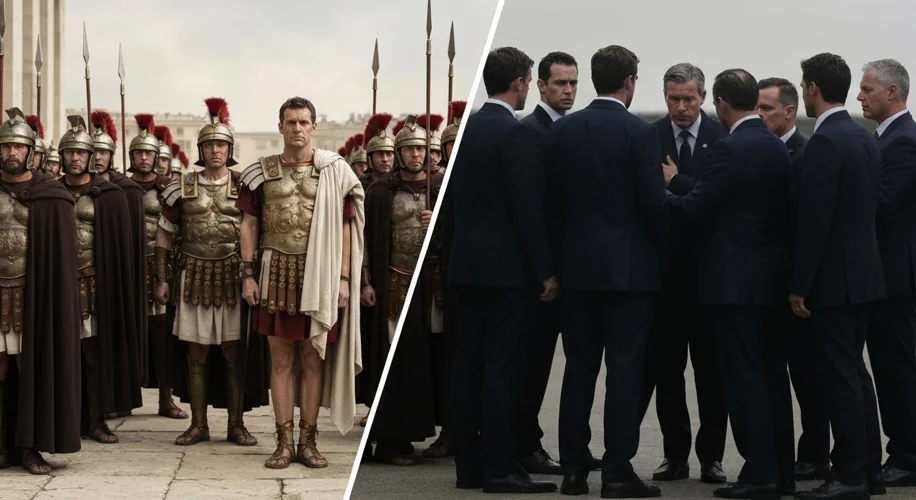In the grand theater of history, where emperors rose and fell, and nations were forged and shattered, the loyalty of those closest to power has always been the most fragile, yet the most potent, force. We often look to the grand armies or the eloquent diplomats to understand the shifts in power, but sometimes, the true story lies within the shadows, with the elite guards and clandestine agencies tasked with protecting—or sometimes, seizing—the reins of authority.
Consider the Praetorian Guard, the formidable personal bodyguard of Roman emperors. For centuries, these hardened warriors were the emperor’s shadow, a legion of elite soldiers stationed within Rome itself. Their loyalty, however, was a complex tapestry woven with privilege, political ambition, and, ultimately, self-interest. While they could be a formidable shield against external threats and internal dissent, history also records their chilling role as kingmakers and assassins.

Born from earlier Roman military traditions, the Praetorian Guard evolved into a powerful political entity. They weren’t just soldiers; they were kingmakers. The infamous “Praetorian Sale” of the imperial throne in 193 AD, where the Guard auctioned the emperorship to the highest bidder, Helvius Pertinax, and then, upon his execution, to Didius Julianus, paints a grim picture of their ultimate allegiance: to wealth and power, rather than to the state or a specific leader. Their loyalty was a commodity, bought and sold in the chaotic marketplace of Roman politics. Their success was measured not just in protecting emperors, but in their ability to influence succession and gain concessions for themselves.
Fast forward through millennia, and we encounter echoes of this dynamic in different forms. The Janissaries of the Ottoman Empire, for instance, were an elite infantry force, initially drawn from Christian boys taken as tribute (the Devşirme system) and converted to Islam. Raised from childhood to be utterly devoted to the Sultan, they were a fearsome military machine. For a time, their loyalty was legendary, a crucial element in the Ottoman Empire’s expansion. Yet, like the Praetorians, their immense power eventually became a double-edged sword. By the later centuries, they had become a powerful lobby, often revolting and deposing Sultans who threatened their privileges, demonstrating that even a system designed for absolute loyalty could be subverted by institutional self-preservation and a thirst for power.
Contrast these historical entities with modern intelligence agencies and protective services. The United States Secret Service, for example, is tasked with a singular, unwavering mission: protecting the President of the United States and their families. Their training is rigorous, their dedication often lauded. Unlike the Praetorians, who could and did influence imperial succession, the Secret Service operates under a clear chain of command and a strict legal framework. Their loyalty is theoretically to the office of the President and the Constitution, not to a person. Their success is measured by their ability to prevent threats, to blend into the background and neutralize danger before it materializes.

Then there’s the KGB, the Soviet Union’s infamous Komitet Gosudarstvennoy Bezopasnosti. A vast and shadowy organization, the KGB was the sword and shield of the Communist Party and its leaders. Its mandate extended far beyond personal protection, encompassing espionage, counter-intelligence, and political repression. The loyalty of KGB agents was to the ideology of the Soviet Union and, by extension, to the General Secretary. However, as the Soviet Union itself unraveled, the nature of that loyalty, and the KGB’s ultimate success, became subjects of intense scrutiny and debate. Were they truly serving the state, or the party’s elite? When the USSR dissolved, many former KGB officers transitioned into new roles, some in the successor agency, the FSB, and others into business and politics, suggesting that ultimate loyalty, even in such a formidable organization, could be pragmatic.
What then, are the threads that bind these disparate groups – the Praetorians, the Janissaries, the Secret Service, and the KGB – in their quest for loyalty and their wielding of power? Several factors emerge:
1. Indoctrination and Training: From childhood (Devşirme) to intensive modern training, these groups are molded to a specific ethos. The Praetorians were trained from a young age, steeped in Roman military tradition. The Janissaries were raised in barracks, isolated from outside influence. Modern agencies invest heavily in psychological and professional training to instill a sense of duty and mission.
2. Exclusivity and Elite Status: Membership in these organizations confers status and privilege. This exclusivity can foster a strong sense of camaraderie and a commitment to upholding the group’s reputation and interests. The Praetorians enjoyed special privileges and pay, setting them apart from the regular legions.
3. Direct Dependence: The Praetorians and Janissaries were often directly rewarded by their leaders with wealth and power. This created a symbiotic, if precarious, relationship. Modern protective services, while not directly paid off by individuals, derive their authority and resources from the leaders they protect.
4. The Nature of the Threat: The perceived existential threats faced by the leaders they protect can forge intense bonds. When the leader’s life is constantly in danger, the protectors can develop a powerful sense of purpose.
5. The Political Environment: Perhaps the most crucial element is the political context. In unstable regimes, where power is constantly contested, elite guards and intelligence agencies can become kingmakers, their loyalty becoming a negotiable asset. The Roman Empire, with its frequent civil wars and disputed successions, was fertile ground for the Praetorian Guard’s manipulation of power. The Soviet Union’s rigid, centralized political system allowed the KGB immense influence.

The ultimate success of these bodies is a complex equation. The Praetorians and Janissaries, while initially successful in their protective and military roles, ultimately succumbed to their own power, becoming destabilizing forces that contributed to the downfall of the very systems they were meant to serve. Their loyalty, while sometimes fierce, was ultimately conditional. The Secret Service, in its modern iteration, strives for a more professional and apolitical loyalty, its success measured in the absence of events, the quiet prevention of disaster. The KGB, a tool of a state ideology, ultimately saw its fate intertwined with the collapse of that ideology.
In the end, the history of elite guards and intelligence agencies is a cautionary tale about power. It reveals that while loyalty can be cultivated through training, privilege, and shared purpose, it is most vulnerable when intertwined with unchecked political influence. The most successful protectors are often those whose loyalty is to a principle or an institution, rather than to an individual whose fortunes can so easily change. The echoes of the Praetorians remind us that even the most formidable shields can become the sharpest swords when loyalty is for sale.

